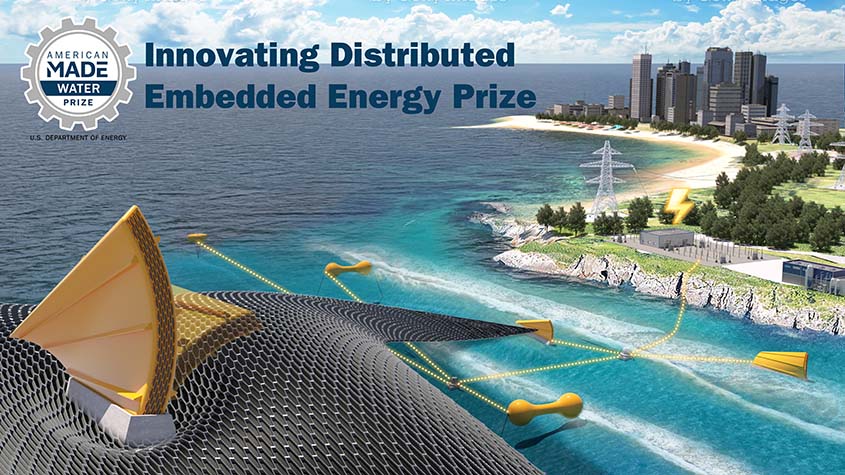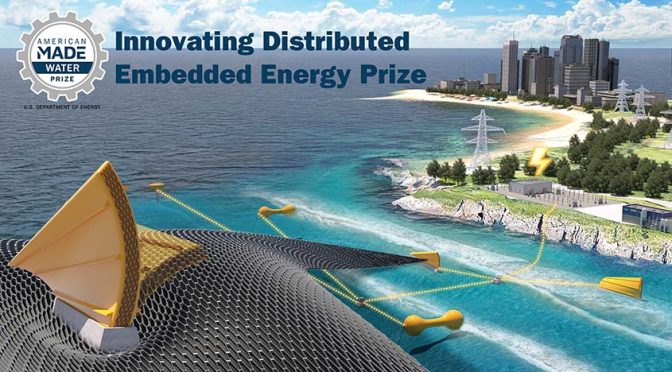Imagine using the force of ocean waves to power the nation’s coastal cities. With wave energy being the most abundant and geographically diverse marine energy resource in the United States, it is possible.
Last week, the U.S. Department of Energy’s Water Power Technologies Office launched the Innovating Distributed Embedded Energy Prize (InDEEP) in partnership with the National Renewable Energy Laboratory and Sandia National Laboratories. The prize aims to forge a path for early-stage marine energy technologies to one day help power the nation’s grid and coastal cities. Specifically, this prize will award up to $2.3 million to competitors investigating distributed embedded energy converter technologies (DEEC-Tec).
DEEC-Tec combines many small energy converters, often less than a few centimeters in size, into a single, larger structure that converts the movement of ocean waves into energy. This larger system could convert energy from a wide range of ocean locations and wave types. InDEEP aims to support early-stage DEEC-Tec research that lays the foundation for the eventual deployment of these technologies at all scales, including at the utility-grid scale.

New marine energy technologies have a key role to play as the United States works toward net-zero carbon emissions by 2050. The total available wave energy resource in the United States is equivalent to approximately 34% of all U.S. power generation in 2019, but although wave power has exciting potential, it is also a complex energy resource. InDEEP participants will investigate novel technologies that could harness and convert the power of ocean waves into usable types of energy, like electricity.
Over two years and three phases, InDEEP will incentivize the development of novel DEEC-Tec-based concepts with a focus on goals that:
- Leverage innovation to systematically develop DEEC-Tec concepts, which could bring value to the ocean wave energy conversion industry
- Build a solver community by engaging and facilitating collaboration between diverse innovators inside and outside the marine energy industry and related DEEC-Tec disciplines
- Encourage development of novel DEEC-Tec concepts with high potential relevant to ocean wave energy conversion by supporting an interdisciplinary set of competitors as they move from ideation to design
- Refine wave energy converter innovation methods to incorporate ideas from beyond the field of wave energy based on feedback from the prize.
The task in subsequent prize phases will increase in complexity for competitors. Phase I will center on team building and concept creation, awarding up to 20 teams $15,000 each. The first phase is now open for submissions and will close on Aug. 25, 2023.
Phase II will be open to both new and returning competitors, who will focus on developing a simple proof-of-concept prototype for a single distributed embedded energy converter. The third and final phase will invite Phase II winners to combine multiple distributed embedded energy converters into a structure, called a metamaterial, which will then be tested in a laboratory.
In addition to cash prizes, competitors will receive multiple types of support throughout the prize, including training in innovation methods, connections with commercialization mentors, and an introduction to marine energy.
InDEEP encourages knowledge transfer among industries focused on distributed embedded energy converters, so experience in marine energy is not required to compete. Those new to the industry will have the opportunity to gain knowledge through trainings and engagement with wave energy experts.
Help advance emerging marine energy technologies in support of the clean energy transition by joining the prize! Visit American-Made Challenges to stay up to date with other U.S. Department of Energy competitions designed to spur innovation in clean energy.

